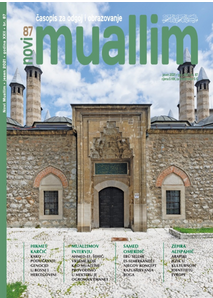EFIKASNOST PODUZETIH MJERA ISLAMSKE ZAJEDNICE U BiH U DOBA VANREDNE SITUACIJE IZAZVANE PANDEMIJOM VIRUSA COVID-19 NA PRIMJERU MUFTIJSTVA ZENIČKOG
EFFICACY OF MEASURES TAKEN BY THE ISLAMIC COMMUNITY IN B&H DURING THE COVID 19 PANDEMIC WITH ZENICA MUFTIJSTVO AS AN EXAMPLE
Author(s): Muharem Adilović, Anela Hasanagić, Ajdin HuseinspahićSubject(s): Islam studies, Security and defense, Health and medicine and law, Sociology of Religion
Published by: Rijaset Islamske zajednice u Bosni i Hercegovini
Keywords: Crisis situation; institutional response; Islamic Community;
Summary/Abstract: Religious communities have a very significant role in social life of an individual, member of that community. It is often the case that some measures are announced by the government bodies, but the faithful are still expecting to hear the messages from the religious community’s officials before they comply with. The similar situation we have seen in the region of Bosnia and Herzegovina, when on March 17th 2020, a decision was made to ban public gatherings, congregational prayers for all denominations including the ban of jummah salah as well as all the other congregational prayers. IC adhered, entirely, with this decision of the Crises Headquarters, but the question rises as of whether these decisions were compiled keeping in mind the practice and also what were the sentiments of jamaats in this process, did they receive what they needed from the religious community during pandemic and in what ways the employees of the Islamic Community faced this challenge. The aim of this article is to analyse the adherence to these decisions and to observe the sentiments of jamaats regarding this and also to compare the degree of adherence in a number of majlis within Zenica Muftijstvo. For this purpose, a research was carried out using a quantitative method with a use of descriptive and quasi-correlational design. We attempted to involve larger number of respondents to answer 15 constructed questions from the questionnaire. Quantitative part of research involved 604 respondents from Zenica, Tešanj, Teslić, Zavidovići and Maglaj. Respondents were reached through jamaat boards who filled out the questionnaires and sent them back through their imams. The results show that imams were fully complying with epidemiological measures and that they stressed the significance of the same while insisting on strict adherence to the instructions issued by the authorities. It also showed that the jamaats of the Majlises of Tešanj, Teslić, Zavidovići, Doboj and Maglaj reported, statistically, significantly more frequent insistence of their imams and the representatives of jamaat boards, in comparison to those of Zenica and Doboj Majlises, for all who come for prayers to the mosque to wear masques, bring their own sajada and tasbeeh and to keep required distance. It also showed that socio-demographic variables were not significant predictor of the sentiments of jammat towards the issued measures.
Journal: Novi Muallim
- Issue Year: 2021
- Issue No: 87
- Page Range: 3-17
- Page Count: 15
- Language: Bosnian

